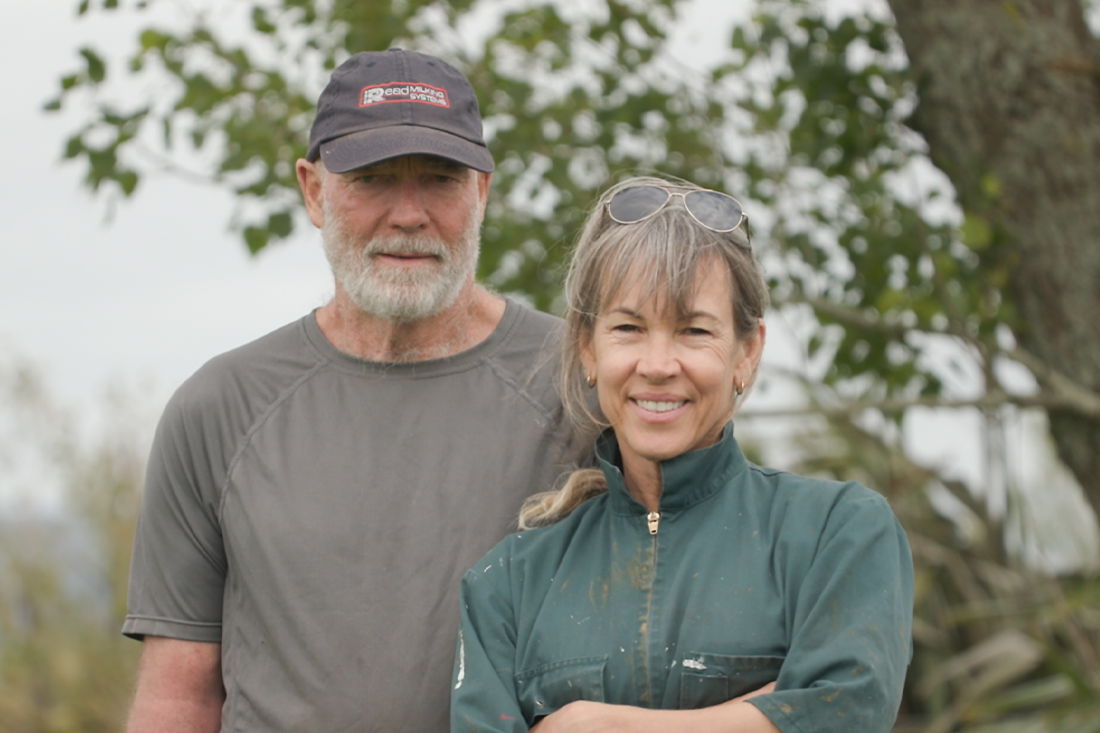We talk to Waiuku farmers Stephanie and Craig Maunsell about their experience in the Co-op’s Organics Programme.
New Zealand is well-suited for farming organic grass-fed dairy with an ideal climate, geography, and environment for pasture. The Co-op has run an organic programme since 2002, progressively growing supply, product range and value. Organic dairy farmers enjoy a premium for their milk, and demand is increasing.
Waiuku farmers Stephanie and Craig Maunsell have been farming under organic principles for 17 years and have been certified for the past 10 years. We talk to the couple about how organics suits their 240-strong herd.
Have you noticed similarities between conventional and organic farming?
Stephanie: There are many challenges in farming day-to-day, whether you’re organic or conventional. You can’t just walk away and leave it to someone else. You care about the animals, and you tend to have people working for you that care about the cows. With organic farming, it’s farming the way our grandparents and great-grandparents used to: sensible stocking rates, focusing on prevention instead of the cure, caring for the land and using regenerative agricultural practices.
Tell us about your pasture management
Stephanie: We direct drill with a seed mix that includes a diverse range of pasture species – I think there are about 11 different types of seed in the mix, not just rye and clover. We have a lot of chicory with a long taproot, which is great during really wet weather and also in droughts. Legumes fix nitrogen out of the air, so we don’t need additional nitrogen. The cows know what they like in terms of pasture. They’ll walk straight through the old pasture (rye and clover mix) and go straight to the diverse pasture mix. They love it. With organic farming, we’re not putting in anything detrimental to the cows, and we’re getting a higher quality product – and I think that consumers are starting to be more aware of how important that is.
Craig: Getting the basics of soil health right is important. You get the soil right, you get good pasture, and you get animal health. It goes on from there. We never used urea or palm kernel previously, so it wasn’t a big transition for us to become organic. Penicillin, nitrogen and glyphosate are relatively recent additions to farming. Farmers managed for years without these chemicals. We still use a form of phosphate, such as Guano Phosphate (a natural fertiliser derived from seabird droppings), but don’t use nitrogen. We find we don’t need it.
How do you deal with animal health organically?
Stephanie: When we entered the Fonterra Organic Programme, we had to get our heads around animal health and how to deal with any issues that could arise. We got a lot of help from Fonterra and by getting together with other farmers. They provided us with great tools and advice for pasture management and animal health. We monitor the animals a lot and take a more preventative approach to animal health. We’re constantly soil testing, blood testing, and doing faecal egg counts. We administer herbal treatments for animals with higher cell counts and teat issues, and make our own supplements and homeopathic remedies. There’s no panacea to just treat certain things, but with a multifaceted approach, you can do it and you can do it well. In saying that, we’re not opposed to conventional treatments. If an animal needs conventional treatment, it will get treatment, but it will be quarantined and sold out of the herd. Animal health and wellbeing is a top priority.
Craig: Overall, we’re seeing higher submission rates when it comes to mating. Our animals are obviously healthier. Organic farming is healthy for the animals, healthy for the land, and healthy for the consumer.
How has the Co-op helped in your organics journey?
Stephanie: The support from Fonterra is incredible. We need to ensure the authenticity of products coming onto the property – for our soil or our animals. If something says it’s organic, we need to be sure it’s certified both for New Zealand and different markets. We need to hold all our certifications to a higher level and have the right paperwork for BioGro. Farm Source is great at helping with this, checking through the system to look up products and get the paperwork. They’ll often recommend products to us or put aside a sample of something that they know would fit our system and that meets the organic criteria. They’re wonderful to deal with.
What is your advice for farmers considering organics?
Stephanie: If you’re not reliant on an intensive high-cost system, then go for it. We’re so lucky in New Zealand to have the climate and the ability to be able to produce high-quality organic dairy products and to be regenerative about the way we farm. Fonterra has such a good global reach to get those products out to customers all around the world. The demand is increasing. You know, it’s not as scary as people think to go organic. Everyone is very supportive.
Are you interested in going organic?
For more information visit nzfarmsource.com/organicmilk.
Or phone Stuart Luxton on 021 241 8797 or email stuart.luxton@fonterra.com.
